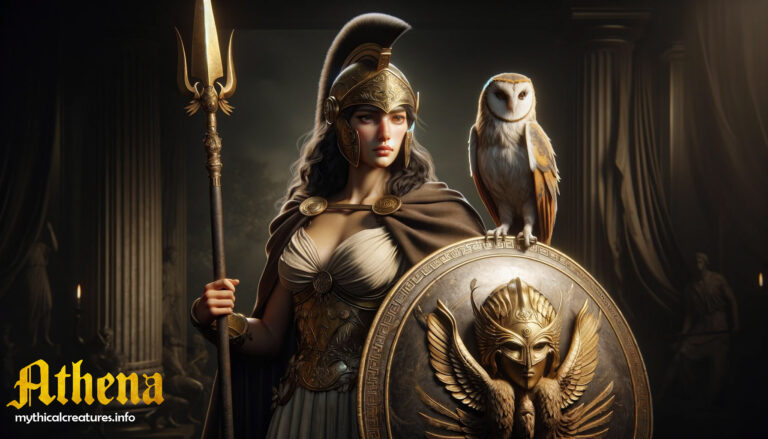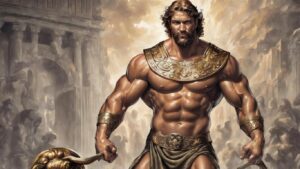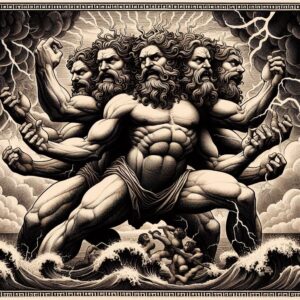Table of Contents
Who is Athena?
Athena, a prominent figure in Greek mythology, personifies wisdom, courage, inspiration, civilization, law, justice, strategic warfare, mathematics, strength, strategy, the arts, crafts, and skill. She, one of the twelve Olympian deities, is considered the daughter of Zeus, the king of the gods, and Metis, a Titaness associated with wisdom.
Mythology recounts Athena’s birth fully grown and armored from Zeus’s forehead after he swallowed her pregnant mother, Metis, fearing her child’s potential surpassing his own. Often depicted with an owl symbolizing wisdom, Athena is linked to Athens, the city named in her honor, and the iconic Parthenon temple.
Athena’s role spans various myths, portraying her as a wise and strategic goddess valuing intellect and justice. She is renowned for protecting heroes like Odysseus and Perseus in Greek mythology.
Role
In Greek mythology, Athena’s multifaceted role encompasses significant aspects of life and civilization:
Goddess of Wisdom: Embodies intelligence, strategic thinking, and knowledge, often symbolized by owls.
Goddess of Strategic Warfare: Associated with disciplined and strategic aspects of war, favoring heroes using intelligence and skill.
City Patron: Athena serves as the patron goddess of Athens, representing civilized and ordered societal aspects.
Protector of Heroes: Portrayed as a guardian for heroes like Odysseus and Perseus, providing wisdom and assistance.
Goddess of Arts and Crafts: Linked to artistic and craft endeavors, credited with inventions like the plow and flute.
Justice and Law: Sometimes associated with justice, upholding order and fairness in society.
Athena, a complex deity, blends intellectual and martial qualities, influencing various facets of Greek life.
Birth
Athena’s birth, a notable episode in Greek mythology, is associated with Zeus and the Titaness Metis. The story unfolds as follows:
Prophecy of Metis: A prophecy foretells that Metis’s child would surpass Zeus in power. To prevent this, Zeus swallows Metis during her pregnancy.
Athena’s Birth from Zeus’s Forehead: Suffering headaches, Zeus has Hephaestus cleave his head with an axe. Athena emerges fully grown and armored, ready for battle.
Fully Formed Goddess: Unlike other deities, Athena skips infancy and emerges as an adult, showcasing her connection to wisdom and strategy.
This myth underscores Athena’s wisdom and strategic prowess, illustrating Zeus’s cunning to prevent a prophecy while allowing Athena’s existence. The Parthenon, dedicated to Athena in Athens, commemorates her unique birth.
Beautiful Medusa
Medusa, famed for her snake-hair and petrifying gaze, transforms from a beautiful mortal into a mythical creature in Greek mythology.
Athena’s Wrath: Medusa’s beauty attracts Poseidon in Athena’s temple. Angered, Athena punishes her, turning her hair into snakes or transforming her into a Gorgon.
Transformation into a Monster: Regardless of details, Medusa becomes a Gorgon, a monstrous figure capable of turning people to stone.
Perseus and Medusa: Hero Perseus beheads Medusa, using divine gifts to avoid petrification. From her body, Pegasus and Chrysaor emerge.
While commonly perceived as monstrous, Medusa’s portrayal varies in ancient art, sometimes emphasizing her initial beauty.
The Contest
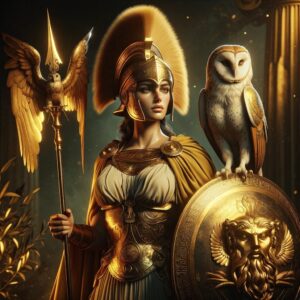
The “Contest” among Athena, Hera, and Aphrodite, known as the Judgment of Paris, crucially leads to the Trojan War:
The Discord: Eris throws a golden apple inscribed “For the Fairest” into the goddesses’ midst at Peleus and Thetis’s wedding.
The Three Goddesses: Hera, Athena, and Aphrodite claim the apple, prompting Zeus to let mortal Paris judge.
The Bribery: Each goddess offers Paris a bribe. Paris, swayed by Aphrodite’s promise of love, awards her the apple.
Paris’s Decision: This sparks the abduction of Helen, instigating the Trojan War.
The Judgment of Paris triggers significant events in Greek mythology, detailed in works like Homer’s “Iliad” and “Odyssey.”
Family
In Greek mythology, Athena, often considered Zeus’s daughter and Metis’s offspring, has a unique birth. Born fully grown from Zeus’s forehead after swallowing Metis, Athena lacks traditional family ties.
Athena, a virgin goddess, lacks a consort or direct offspring. Her relationships with heroes symbolize mentorship rather than familial connections. In some versions, Athena is linked to Hephaestus’s birth, hinting at her involvement in unique childbirth.
Athena, a key Olympian figure, embodies unconventional family ties while playing essential roles in Greek mythology.
Appearance (Athena)
Classical Greek art depicts Athena as a mature, majestic woman clad in armor, wielding a shield and spear. Key elements include:
Armor and Weapons: She wears a helmet, carries a shield, and wields a spear, emphasizing war and strategy.
Owl: Symbolizing wisdom, an owl often accompanies Athena in art.
Attire: Adorned in classical Greek attire, She wears a peplos or chiton.
Demeanor: Exhibiting a serious and regal demeanor, Athena conveys intelligence, strength, and authority.
Gorgon’s Head: A protective symbol, the Gorgon’s head appears on Athena’s shield, warding off evil.
Sandals and Aegis: Athena may wear winged sandals and the Aegis, a protective cloak, enhancing her divine presence.
Artistic depictions vary, emphasizing Athena’s divine qualities and mythological roles.
Symbology
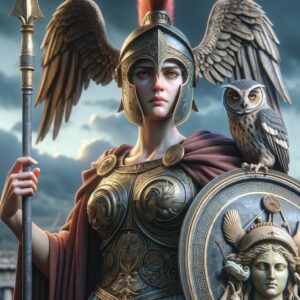
Athena’s symbols convey her multifaceted nature and roles in Greek mythology:
Owl: Symbolizing wisdom and foresight, the owl is Athena’s iconic representation.
Shield and Spear: Emphasizing war and strategy, Athena often carries a shield and spear, the shield bearing the Gorgon’s head.
Aegis: A protective cloak or shield associated with divine power, often adorned with the Gorgon’s head.
Gorgon’s Head: A potent protective emblem, the Gorgon’s head signifies Athena’s ability to ward off evil.
Olive Tree: Athena’s gift to Athens, the olive tree symbolizes peace, prosperity, and abundance.
Serpent: In some depictions, Athena is associated with serpents, symbolizing power and wisdom.
These symbols collectively represent Athena’s diverse attributes and significance in Greek mythology, shaping artistic, literary, and religious expressions.
Godess and Athens (City)
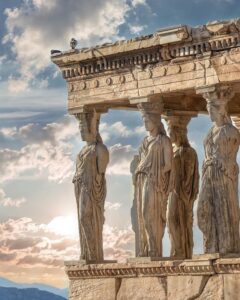
Athena’s strong association with Athens originates from a contest where she and Poseidon vied for the city’s patronage:
The Contest: Athena and Poseidon compete by offering gifts. Athena’s gift, an olive tree symbolizing peace and prosperity, wins over Poseidon’s saltwater spring.
Athena’s Victory: Chosen as Athens’ patron goddess, the city is named in her honor. The olive tree becomes a symbol of Athens.
Palladium: The sacred olive tree wood constructs the Athena Parthenos statue, a divine protector in the Parthenon.
Beyond the naming myth, Athena protects Athens and influences its cultural and religious identity. The Parthenon, dedicated to Athena, stands as an enduring symbol of her connection to the city.
Athena FAQ
Who is Athena?
Athena is a prominent figure in Greek mythology, known as the goddess of wisdom, courage, inspiration, civilization, law, justice, strategic warfare, mathematics, strength, strategy, the arts, crafts, and skill. She is one of the twelve Olympian deities and is considered the daughter of Zeus and Metis.
What does Athena look like?
Athena is often depicted as a mature and majestic woman clad in armor, wearing a helmet, and wielding a shield and spear. She has a regal demeanor and is sometimes accompanied by an owl, symbolizing wisdom.
How old is Athena?
In Greek mythology, gods and goddesses do not age in the way humans do. Athena is considered immortal and doesn't have a specific age.
What is Athena's symbol?
Athena's symbols include the owl (symbolizing wisdom), shield and spear (emphasizing war and strategy), the Gorgon's head (a protective emblem), the olive tree (representing peace and prosperity), and the Aegis (a protective cloak).
What is Athena the god of?
Athena is the goddess of wisdom, courage, inspiration, civilization, law, justice, strategic warfare, mathematics, strength, strategy, the arts, crafts, and skill.
How was Athena born?
Athena was born fully grown and armored from Zeus's forehead after he swallowed her pregnant mother, Metis, fearing her child's potential surpassing his own.
Why did Athena curse Medusa?
Athena cursed Medusa because of an incident where Poseidon violated Athena's temple with Medusa. In some versions, Athena punished Medusa by transforming her into a Gorgon, a creature with snakes for hair and a gaze that turned people to stone.
How did Athena die?
In classical Greek mythology, gods and goddesses, including Athena, are immortal and do not die.
What does Athena mean?
The name Athena is of Greek origin and is often interpreted to mean "sharp" or "wise." It reflects her role as the goddess of wisdom.
Who is Athena married to?
Athena is often considered a virgin goddess and is not traditionally married. She doesn't have a consort or direct offspring.
How does Athena help Odysseus?
In Homer's "Odyssey," Athena is a key ally and protector of Odysseus. She aids him by providing guidance, disguising him, and intervening with other gods on his behalf during his long journey home.
Who is Athena in the Odyssey?
In the "Odyssey," Athena is a major character and serves as the protector of Odysseus. She supports him in his quest to return home and plays a crucial role in his interactions with other characters.
Where does Athena live?
Athena is often associated with Mount Olympus, the home of the Olympian gods in Greek mythology.
What did Athena do?
Athena played various roles in Greek mythology, including being a goddess of wisdom, strategic warfare, and the arts. She protected cities, guided heroes, and was associated with justice and law.
What powers does Athena have?
Athena is known for her powers of wisdom, strategic thinking, and skill in warfare. She possesses divine abilities, including protection, guidance, and influence over various aspects of civilization and the arts.
